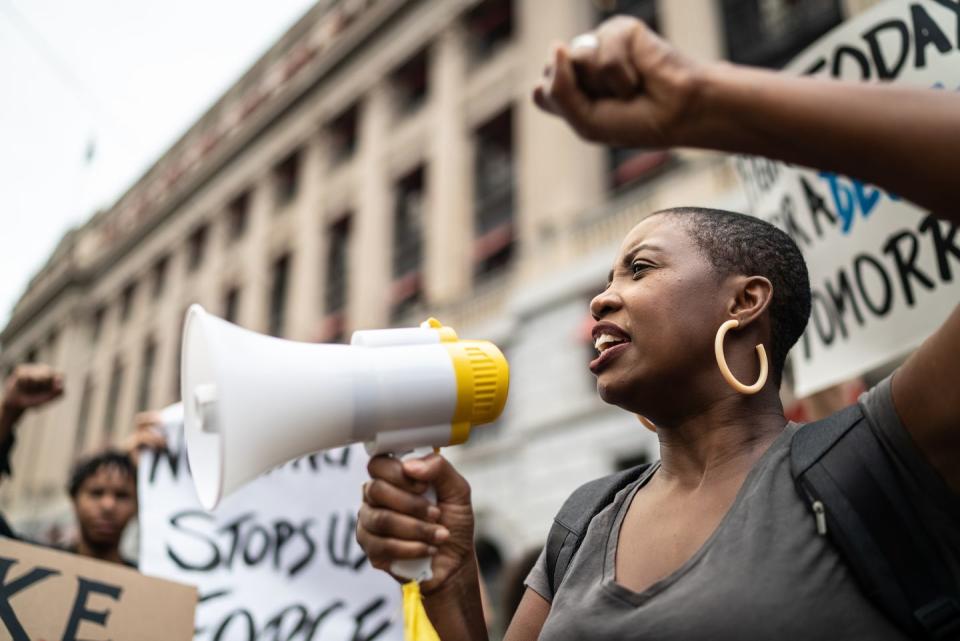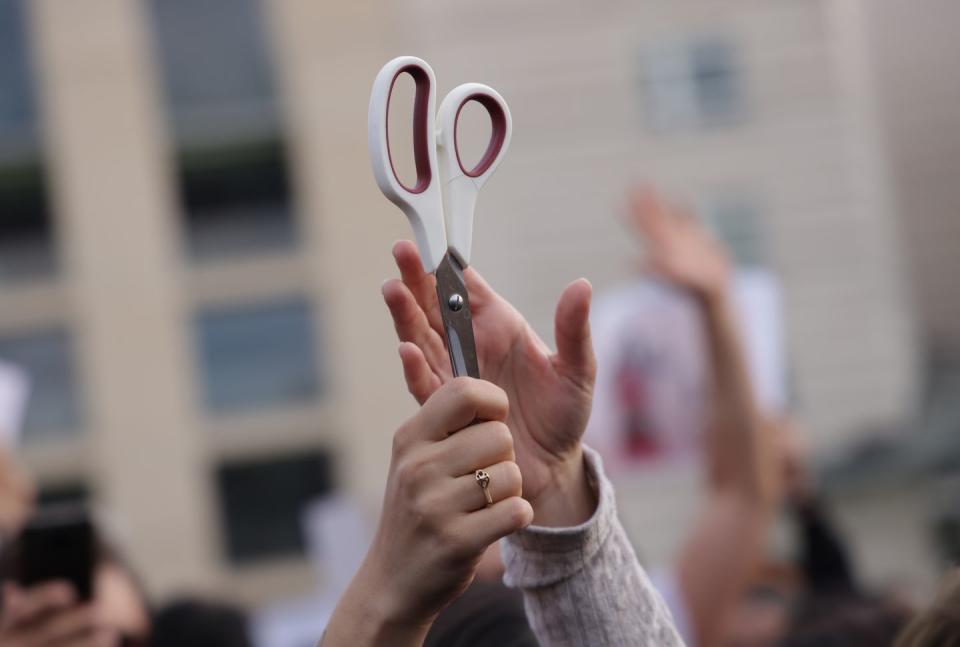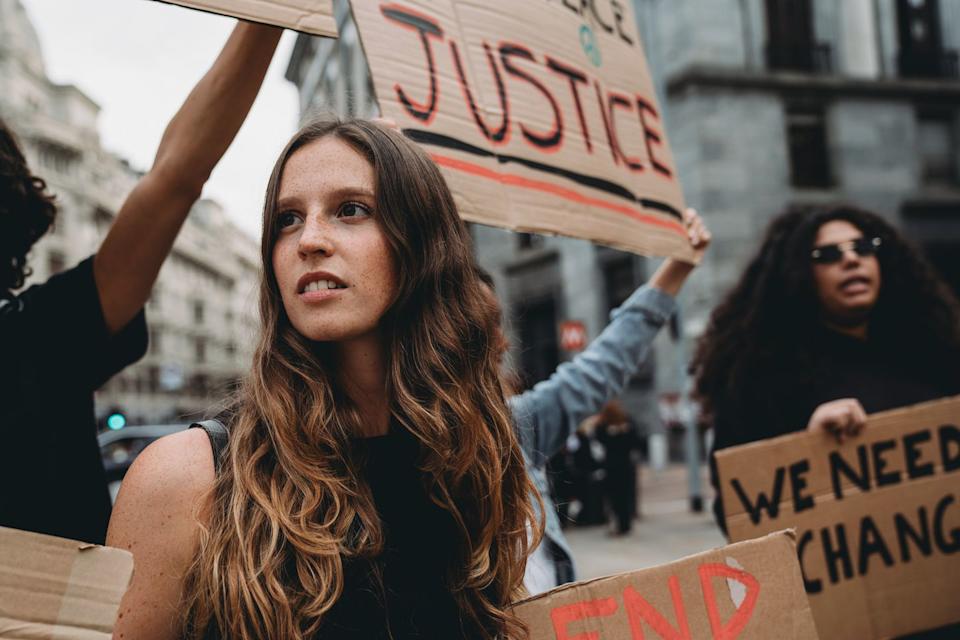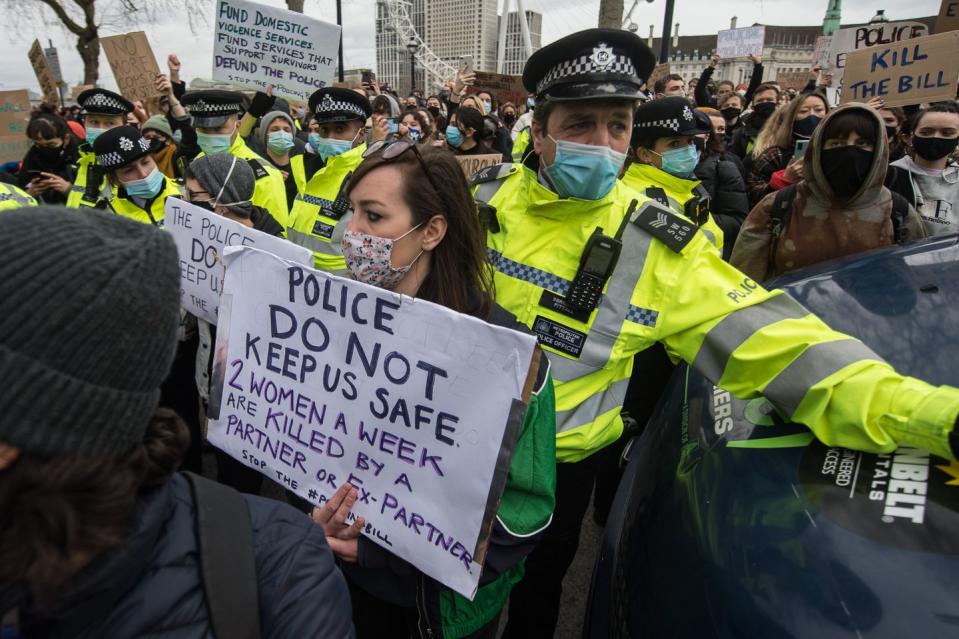How Women Around The World Are Fighting For Justice And Using Their Power To Unite Us All

For both Emily Paterson and Shohreh Bayat, there came a clear moment when they realised they had to speak out. Half the world away from each other and many months apart, they had the same epiphany: ‘If not me, then who?’ Paterson, 45, an American who describes herself as a ‘suburban soccer mom’, was arrested while protesting for abortion rights at the Supreme Court in Washington DC November, while Bayat, an Iranian chess referee, was in China at a tournament in 2020 when, facing harassment from the Iranian regime from afar, she realised she could no longer keep her hair covered with a hijab. It foreshadowed what was to follow in her home country.
‘It was then I knew I had to take a stand,’ Bayat recalls. ‘I didn’t want to show a fake image anymore. I was tired of being used by the regime, of being a poster girl for them; they wanted me to present an image of a religious Muslim woman and I wasn’t.’ Paterson’s act of civil disobedience, meanwhile, which came ahead of last year’s mid-term elections, was intended to remind voters that ‘abortion rights were on the ballot’. She says: ‘I thought that I would be a hypocrite if I didn’t do it, because my value system is firmly based in the idea that when we see injustice, we have to act.’
Like Paterson and Bayat, women across the globe have become ever more emboldened to speak out, to protest and even to risk their lives in the face of oppression. This has come in response to a rolling back of women’s freedoms in several countries, which has reverberated around the world through viral images of frontline protests and Tweets or TikToks containing news of such atrocities you cannot forget seeing them. Indeed, it has been a long period of cognitive shocks when it comes to women’s rights – from the restricted access to abortion in America, to the extraordinary bravery of Iranian women risking their lives – that has reminded us that they want only what we take for granted, while the extreme misogyny of the Taliban has shown how women’s hard-won freedoms can be so swiftly taken away.

The catalysts are complex and varied. In some countries, religious extremists have sought to reassert traditional gender roles, while conflict elsewhere has encroached on women’s rights. Then there has been the rise of a new breed of ‘strongmen’ leaders who have drawn from an authoritarian playbook by attack- ing women, from the former US President Donald Trump, who is considered a hero of the anti-abortion movement, to Turkey’s Recep Tayyip Erdoğan, who in 2021 withdrew his country from the Istanbul Convention (a treaty designed to fight violence against women), spark- ing protests from human-rights groups.
In countries like the UK where the threat is less stark, women have felt a sense of global sisterhood with those whose rights have been repealed. In his famous letter from jail in 1963, Martin Luther King stated the importance of solidarity: ‘Injustice anywhere is a threat to justice everywhere. We are caught in an inescapable network of mutuality, tied in a single garment of destiny. Whatever affects one directly, affects all indirectly.’ Social media has helped women to organise and to build that sense of solidarity, both within countries and beyond their borders. Bayat says that Iranian women, for example, have been inspired by Afghan protesters: ‘There are many strong and brave women who have stood up against the Taliban, and I think this is all connected. We inspire each other and learn from each other.’
Afghanistan is perhaps the most egregious example of the annulment of women’s rights. Since the Taliban retook control in 2021, they have introduced laws limiting women’s ability to work, forced them to dress conservatively and closed schools and universities to girls; yet there are brave feminist activists, such as Kabul-based Monesa Mubarez, who have kept fighting for what they once had. Mubarez, 31, has said: ‘One war ended, but the battle to find a rightful place for Afghan women has started... We will raise our voice against every injustice until the last breath.’

The war in Ukraine has also seen women’s resistance become headline news. Since the invasion last February, Russian soldiers have used sexual violence as a weapon of war. Yet Ukrainian women have been at the forefront of the nation’s war efforts, with the first lady Olena Zelenska saying at the start of the conflict that ‘our current resistance has a particularly female face’. One example is Kseniya Draganyuk, 26, who founded the initiative Zemlyachki to help women on the front line stay well-equipped, and to spread their stories on social media. ‘We are a strong nation, and our women are really strong too,’ she says. ‘Freedom means life to us, so we will never give up... Imagine that Putin broke into your house, and you need to protect your children; that is how we feel.’
In the US, women have been galvanised to fight for reproductive rights after the Supreme Court overturned Roe v Wade, the 1973 legislation that made access to abortion a federal right in America. This enabled states to set their own policies, and abortion procedures in most circumstances are now banned in 13 of them. The uproar against the ruling was swift, with demonstrators taking to the streets, holding placards with slogans such as ‘My body, my choice’ and, when they protested outside politicians’ homes: ‘Don’t like me at your house? Get out of my uterus’.
Then in September, the death of 22- year-old Mahsa Amini in Iran sparked widespread protests against the country’s authoritarian rule. The movement’s rallying cry has been: ‘Women. Life. Freedom’. Amini died from suspected brain damage caused during her detainment by the morality police. She was believed to have been arrested for wearing her headscarf in an ‘improper’ manner. Many campaigners in Iran have since paid the ultimate price for their courage, with those killed including teenage girls such as Nika Shakarami, who was just 16 when she disappeared at a protest in Tehran, and mothers such as 62-year-old Minoo Majidi, who was shot by security forces.
Bayat’s experiences after removing her hijab at the chess tournament two years earlier were a harbinger of what was to come for Iranian women. ‘Now I must be a voice for the Iranian people,’ she says. ‘We all shared the common pain that Mahsa felt. So many women have been harassed by the morality police... People [in the West] don’t necessarily understand that hijab is not our culture. Iranian women have the same values as modern women all around the world, but they are stuck in a system where they cannot express themselves.’


In Iran, it has been a long battle for greater freedoms. Women won the right to vote in 1963 as part of the White Revolution, and expanded divorce and custody rights followed. But since the Islamic Revolution of 1979 their rights have been restricted and a public dress code has been imposed. Iranian women are desperate to taste real freedom again. It is a freedom we cannot take for granted. The conflict in Ukraine illustrates how women’s rights come under assault in periods of turmoil – war being the most extreme form – but also shows how women fight back. ‘There are 30,000 women who enjoyed civil life before the war, and they didn’t know about military life: they were a barista, a journalist, maybe a teacher,’ says Draganyuk, 26. ‘But they joined the Ukrainian armed forces to defend their homes, their children and their lives against Russian aggression. The conditions are very difficult – some have to sleep on the ground, they don’t have a shower – but this is the price of freedom.’
The US presents a different danger: that even in one of the most established democracies in the world, women’s rights are not inalienable and can be stripped back. ‘We have to be vigilant, because what happened with Roe v Wade was very gradual, and I did get nervous about what that could herald for us in the UK,’ says Mandu Reid, the leader of the Women’s Equality Party, which campaigns for feminist objectives. ‘You had a very patient campaign by the anti-choice [campaigners] in the US, and those of us who are pro-choice fell into a kind of complacency trap.’

For Paterson, this ‘trap’, and recognising her own privilege, were the reasons she knew she had to ‘step outside [her] comfort zone’. A mother of two sons, she runs her own business and lives in the suburbs of Washington DC. ‘I’m an upper-middle-class white woman, and I felt I had the means to do this protest,’ she says. ‘Even though I knew I would be arrested, I wouldn’t be fired from my job... The Trump years forced me to do a lot of soul-searching around my privilege. I’ve never really had to fight for democracy – it has been stable for me as a white woman. For other groups in our country, it’s never been stable, it’s never been equitable.’
Paterson paid the price for her peaceful protest inside the Supreme Court, where the decision to repeal Roe v Wade was made. She was locked up for 30 hours in a cell with metal bunk beds and no mattress, and transported in boiling-hot vehicles that she said were like coffins. ‘We were given very little food and water, and the conditions were deplorable,’ she recalls. ‘In the US, if people kept their dog in these conditions, they would be arrested, yet here we were in our nation’s capital.’
While women’s rights may not be so under siege in the UK, there are still battles being fought. The murder of Sarah Everard in March 2021 by an off-duty police officer, Wayne Couzens, brought a sharp focus on campaigns to end violence against women, but also led to a wider debate about institutional misogyny. ‘Police forces have been under scrutiny for years, but mostly from the point of view of racism, rather than sex- ism,’ says Reid. ‘This has been a moment of reckoning for women’s relationship with the police. What we’ve seen is that misogyny travels alongside racism in these institutions. It’s not a few bad apples – it’s a culture. This is women saying that we won’t put up with the status quo.’

British women also took to the streets in October over unaffordable childcare, a sign that people who may not have considered themselves politically minded are engaging. Joeli Brearley, 45, the founder and chief executive of the campaign group Pregnant Then Screwed, who organised the March of the Mummies, says that 62% of women who attended had never been to a protest before. ‘People are absolutely livid,’ Brearley says. ‘We’ve been through a pandemic where it was really apparent that pregnant women and mothers were sidelined in government policy, so it has crystallised that we [parents with young children] are just being completely missed out in these conversations. Now we’re heading into a cost-of-living crisis, which will predominantly affect women, against a backdrop of the child- care sector collapsing.’
That anger is felt more broadly by women across the world: a Gallup poll in December found a gender-fury gap, with women becoming increasingly unhappy over the past decade. Though much of that rage may be about respondents’ own lives, it can also be a motivating force to ask what we can do for women in other countries in worse situations. Reid argues that we mustn’t feel powerless. ‘Iranian and Afghan women are not waiting for us in the West to save them, but they want us to stop saving their oppressors,’ she says. ‘We want our elected officials to take a more robust stance, to say we won’t tolerate the kind of atrocities we’re seeing. We can amplify women’s voices on the ground, but also put pressure on our government to put pressure on the regime that is oppressing them. That is what solidarity looks like.’ The rights of the women of the world are interconnected. If last year’s wave of protests has shown us anything, it’s that we can’t relax until all women enjoy freedom. It’s asking ourselves, ‘If not us, then who?’
This article appears in the March 2023 issue of ELLE UK.
You Might Also Like


